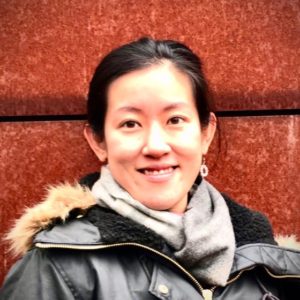Sarah Yeung is focused on building community around conversation in Chinatown
 January 29, 2020
Category: Featured, Medium, People
January 29, 2020
Category: Featured, Medium, People
Sarah Yeung has vague memories of visiting Manhattan’s Chinatown as child — the bakery, the playground and a few other destinations.
For her parents, immigrants from Hong Kong who fled China’s communist regime, living in Central Jersey didn’t provide them with the necessary community space they found visiting the New York City neighborhood.
When it became time for Yeung to attend school at the University of Pennsylvania, majoring in urban studies, she knew from her past experiences that Philadelphia’s bustling Chinatown could provide her with the cultural space she needed away from home.
“Philly’s Chinatown feels like the most magical place in the world,” she said. “I have such a love and respect for the community, and I think it’s a special place because it’s a living, breathing immigrant community.”
Soon after beginning school, Yeung joined the Chinese Christian Church and Center, the place where she would later meet her husband, and became engrossed in community work and volunteerism. Churches were one of the few institutions in Chinatown offering a community space for its residents, Yeung said.
Being a student of urban studies, Yeung began to develop questions: Why do Chinatowns exist? And, why is this low-income, immigrant community located in a downtown area?
To find her answer, Yeung started working as an intern with the Philadelphia Chinatown Development Corporation., an organization which fosters discussions and actions around development in the neighborhood.
“Chinatown has always been a mercantile neighborhood and small business community as well as a residential community and one that has in many ways been built upon this identity of catering to the outside,” Yeung said.
She began as an intern in 2008, became staff a couple years later, then in 2018, left the organization to become their full-time, external consultant.
One of the most impactful PCDC projects Yeung began to provide consulting on was Chinatown Future Histories, looking at the role new development and public spaces play in an evolving neighborhood like Chinatown.
And this project prompted another question: What does Chinatown see for itself, in terms of development, in the next five years, 10 years and beyond?
The project was driven by the ongoing threat of gentrification and the community’s ability to withstand past attempts to divide the neighborhood, like the construction of the Vine Street Expressway.
Part of this project included a series of public walks led by community leaders, who discussed spaces they felt were important to them and the greater neighborhood. Chinatown residents, other Philadelphians, local students and tourists attended.
"We as a society, we hold a lot of assumptions about what is inevitable and what success looks like and what failure looks like."
Chinatown Future Histories had other components like community meetings, and a committee which was formed to reflect the diversity of the neighborhood’s residents and to continue encouraging conversations between major stakeholders.
“It has brought the community around these issue areas in a way that has been surprising to me,” Yeung said. “It brought them together around the same table and it reignited interest in more closely coordinating their efforts, and there was a recognition that we are stronger when we work together.”
Yeung will continue to provide consulting for the Chinatown Future Histories program, shaping discussions around development in the neighborhood.
Chinatown celebrates its 150th anniversary this year and continues to try and find the balance between maintaining its roots and interacting with outside influence. But the community’s no stranger to navigating through what comes with living in a hot market, Yeung said. They’ve done it before, and they’ll do it again.
“We as a society, we hold a lot of assumptions about what is inevitable and what success looks like and what failure looks like,” Yeung said. “And what I learned from Chinatown is that success and failure comes in all forms.”
“And it doesn’t always work like what we expect it to,” she said.
While Yeung was working on Chinatown Future Histories last year, democracy protests in Hong Kong were beginning to intensify. She thought about her family’s origins, freedom and many of the questions that started her journey.
“It just made me think a lot about what we were doing in Chinatown and what we’re doing across the country,” Yeung said. “In contrast to that, how often we hold our freedoms so loosely and how it can be so meaningful, especially to folks who have experienced a different way of life.”
Trending News











